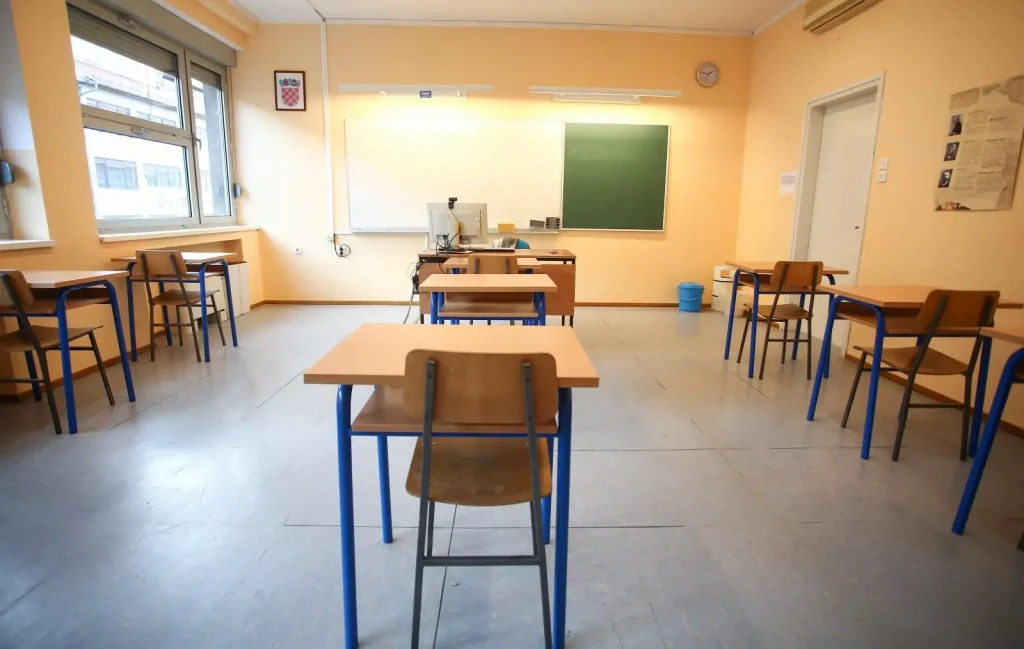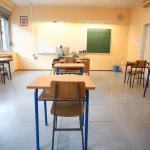On May 14th of this year, the Central State Office for Croats outside the Republic of Croatia announced the call to apply for the scholarship to study the Croatian language in four cities: Zagreb, Split, Rijeka, and Osijek. Applications were closed on June 14th, and the first list of scholarship recipients was published at the end of July. Later, after seven days of appeals by those who did not appear on the first list and others who desisted, a second and final list was published on August 17th.
Although the exact dates for the start of classes are not yet confirmed, it is expected to take place in the first week of October. We wish it were as simple as going from the airport to your desk and starting your Croatian language classes, but there are many things you should take into account before and when you arrive in Croatia (if you are traveling for the first time). Before we begin with the list, it is important to add at this point that there are three contacts with whom you will communicate before, during, and even after your participation in the course, and all three are in charge of different aspects of the scholarship. One is the Central State Office for Croats outside the Republic of Croatia, which is a government body that finances and organizes scholarships to study the Croatian language in the Republic of Croatia. The second is the Croatian language studies department at the Faculty of Philosophy of the city to which you have applied. Finally, you will also communicate with the accommodation in which you will stay during your studies.
Without further a due, here are ten things to keep in mind:
1. Confirm your participation in the course
After seeing your name once the first list was published in July, you probably took your participation in the course for granted. Although it is true that being on the list means having obtained a place to study the Croatian language in Croatia and access certain benefits, it is necessary to confirm your participation, as sometimes it happens that some do not show up or withdraw from their participation. So that the Office in charge can properly prepare the logistics behind the course, make sure to check your mail (both in your inbox and in the spam box). You will find an email asking you to confirm your participation in the course, as well as other instructions.
Weeks prior to your arrival you will receive emails with information about your classes, such as your schedule or classroom. In some cases, you will be asked to take a pre-test online to determine your current level of Croatian. Don’t worry, it’s just to get an idea.
Note: if you have not received a confirmation email, be sure to write to [email protected] and confirm your participation, as well as ask for additional information about the scholarship.
2. Confirm your accommodation
As well as confirming your participation in the Croatian language course scholarship, you will also need to confirm your accommodation, if you qualify for it. The Croatian language scholarship includes a stay in student accommodation in your city, but places are limited. A number of accommodation places have been assigned by each city. For example, 50 places were assigned for accommodation in Zagreb, and to find out if one corresponds to you, you must check your order in the final list of the Croatian language scholarship recipients. If you are in the top 50 on the list for Zagreb, you will most likely have an accommodation quota. Why do I say “most likely”? Because it must be taken into account that:
a) The accommodation right is only given to those younger than 36.
b) Not everyone asked for accommodation on their applications.
That is why we recommend you check your email for any communication from the student accommodation office of your city, in which they will inform you that you are part of the list of those to stay in student accommodation. If not, write an email to the Central Office as in the previous point, since they are the ones who determine the list of students to stay in the student accommodation.
Note: if you have received an email from the student accommodation office, in addition to requesting a confirmation, they will also ask you in advance to indicate the date you plan to check in. Likewise, some student accommodation may request a medical certificate, the format of which will be attached in the mail, and which must be filled out by your doctor or pediatrician. Do not forget to fill it out and bring it printed to do your check-in.
3. Bring all your documentation
During the months prior to the start of the Croatian language course, you have surely gathered a large number of documents and papers that served you for your application. Well, although it is very likely that you will not need them again, we do strongly recommend that you organize a folder in which you archive all the documents related to Croatia. Not only can an unexpected or unforeseen situation arise, but you will also need them if you decide to apply for one more semester of the Croatian language course while in Croatia if you previously only applied to one.
We recommend you have a digital folder, and another with all your printed documents. Some of the things you can bring are:
- Original and copy of your passport (of your country of birth and Croatian, in case you have the latter).
- Original and copy of your ID (from your country of birth and Croatian, in case you have the latter).
- Driver’s license (you can use the one from your country for a year, then you will have to change for a Croatian one at the Police Station).
- Criminal records (apostilled).
- Medical history (translated, preferably).
- Information and details of your international health or travel insurance.
- ID size photos (useful to get your public transport card and other procedures).
Any other documents that you consider convenient to bring, especially those that must be apostilled, we recommend that you include them since it will be difficult to get them later once you are in Croatia.
Every year, many students take advantage of their stay in Croatia to obtain their nationality and/or citizenship (passport). If this is your case, take into account the necessary documents to apply to each one, and be sure to include them in your folder. We recommend you bring:
- Croatian nationality papers (yours, if you have them).
- Croatian nationality papers from your closest Croatian relative (father, grandfather, great-grandfather, great-great-grandfather, etc).
- Your original birth certificate (apostilled, translated, current and notarized if he is a foreigner).
- The original birth certificate of your closest Croatian relative (father, grandfather, great-grandfather, great-grandfather, etc).
- Your passport (original and copy).
- Your ID (original and copy).
- A valid identity document with a visible photo (and an apostilled, translated, and notarized copy).
- Criminal record certificate (no more than 6 months old, apostilled, translated, and notarized).
- Your biography (translated into Croatian and including the reasons for your application).
Note: depending on your case, they may request all these documents, only some or other additional ones. For more information on applying for Croatian nationality and citizenship, check out this guide made by Sara Dyson, from Expat in Croatia, approved by an immigration lawyer and the ministry that approves nationality and citizenship. You can also check the information given by the Ministry of Interior (MUP) in Croatia HERE.
4. Check-in at your accommodation
The first thing you will want to do when you arrive in Croatia if you have confirmed your stay in the student accommodation is to check in and settle in. After the whole trip, and with so many suitcases on top, it is best to rest and organize yourself before moving on to the next thing. For this, it is necessary to have agreed to your arrival date by email with the office of your student accommodation. It may be that in some cases they tell you that it can be done only with some anticipation, both in days and in hours. For example, if your plane arrives on a Sunday afternoon, you may need to spend the night elsewhere and check in first thing in the morning on Monday. In case you haven’t booked your flight yet, the wisest thing would be to fly a few days earlier.
Next, we indicate the address and location of the student accommodation in each city. If you have everything agreed with the office, go to the reception of your accommodation to present your documentation, for checking in, and receiving your room key and accommodation contract.
Zagreb
- Studentski Dom Ante Starčević
Zagrebačka avenija 2, 10000 Zagreb
email: [email protected]
Box office: 01 4590 841, Management: 01 4590 843
Manager: Damir Mikulić, tel. 01 4590 842
Reception / port of the student settlement: 01 4590 840; 091 4593 539
(working hours: 0 – 24h)
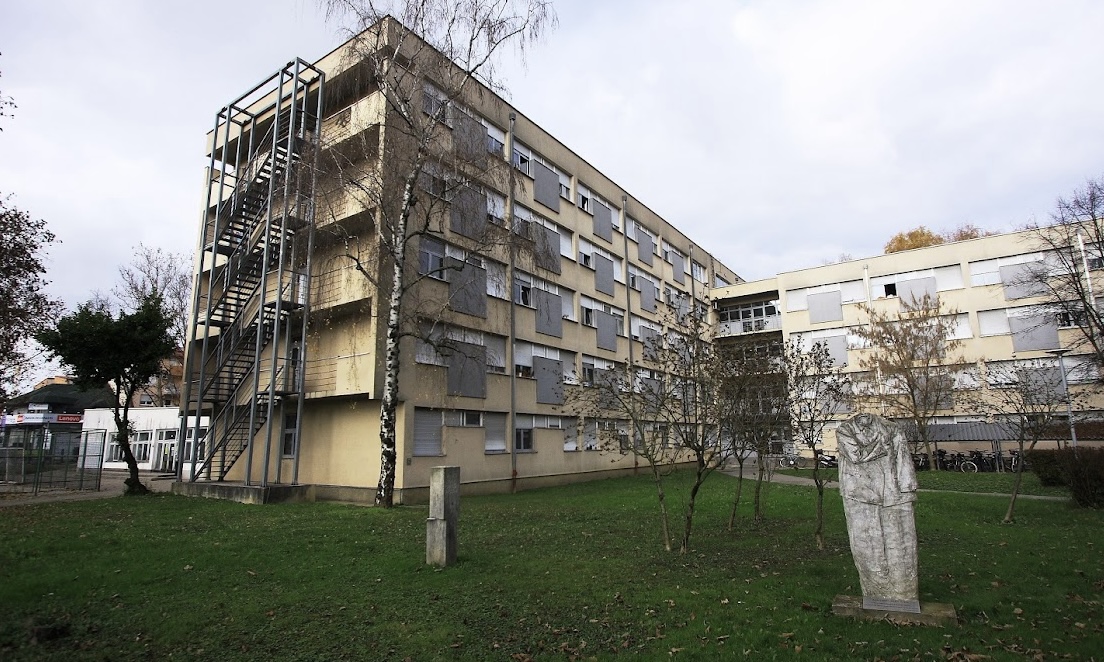
Student Accommodation Ante Starčević (Photo: Pavle Miljovski)
- Studentski Dom Stjepan Radić
Jarunska 2, 10000 Zagreb
e-mail: [email protected]
Tel. administration: 01 45 90 801, cashier: 01 45 90 811, fax: 01 30 15 946
Manager: Boženko Ćosić, tel. 01 45 90 802
Reception / port of the student settlement: 01 4590 800; 091 4593 536
(working hours: 0 – 24h)
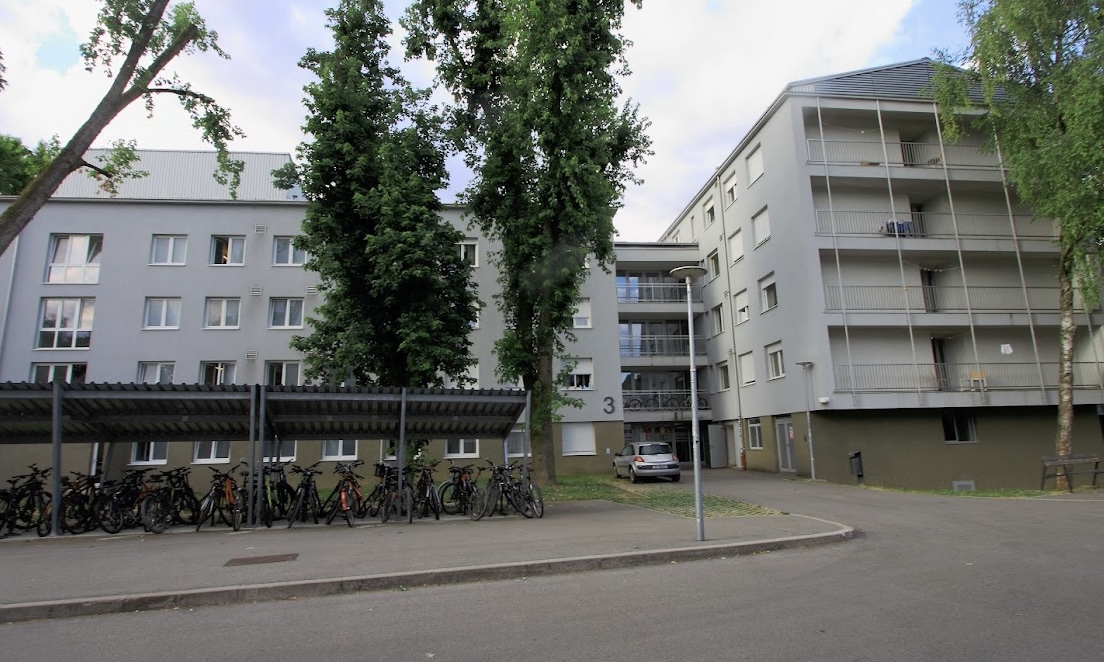
Student Accommodation Stjepan Radić (Photo: Pavle Miljovski)
Split
- Dom Kampus Dr. Franjo Tuđman
Cvite Fiskovica 3, 21000 Split
Tel: 021 / 440 – 999, fax: 021/440-958
e-mail: [email protected] (accommodation hostess)
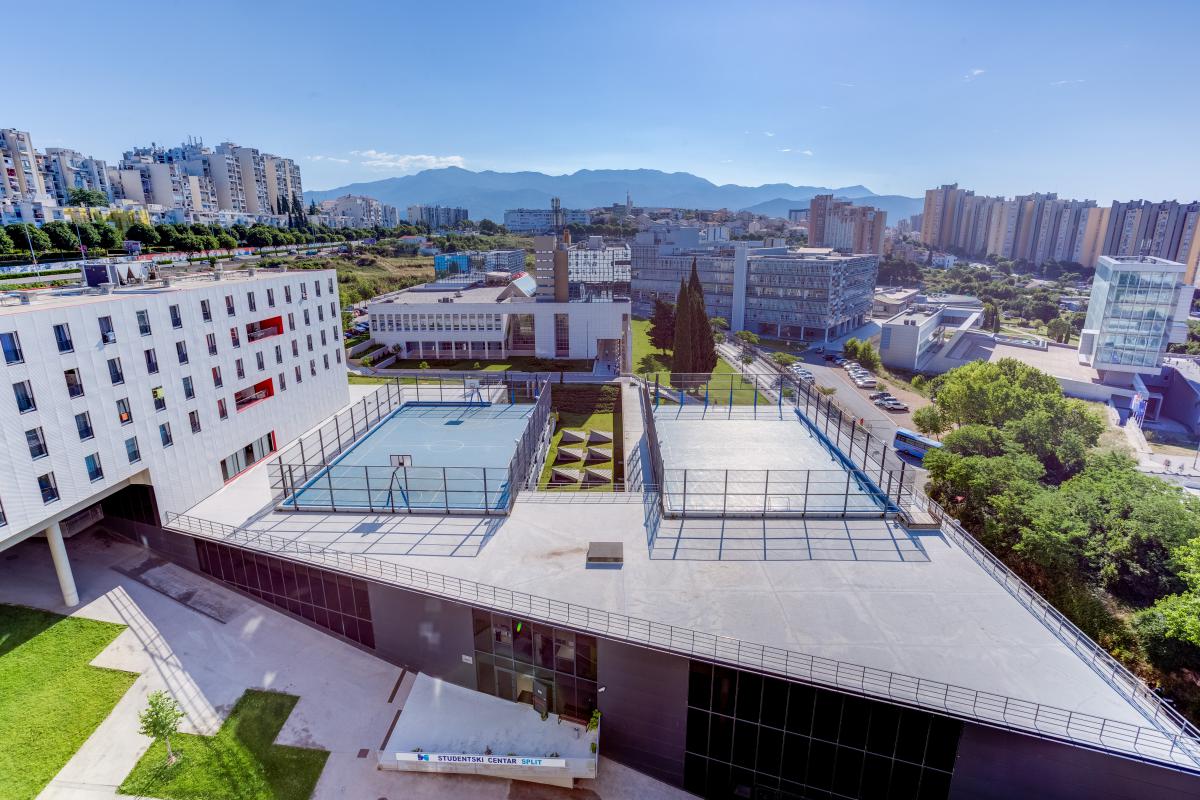
Student Accommodation Franjo Tuđman (Photo: Split Student Center)
- Studentski dom “Bruno Bušić”
Spinutska 37, 21000 Split
Tel. 021 / 510 – 850
e-mail: [email protected]
e-mail: [email protected]
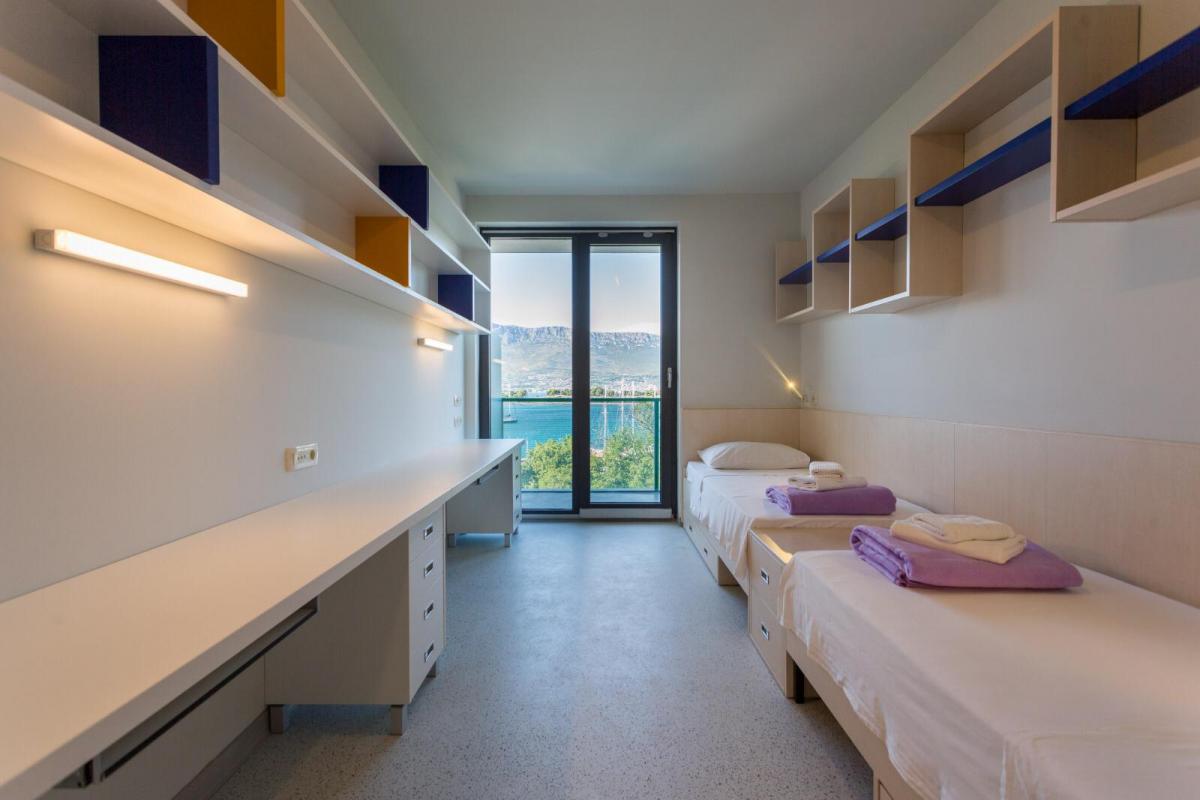
Student Accommodation Bruno Bušić (Photo: Split Student Center)
- Studenski dom Hostel Spinut
Spinutska 39, 21000 Split
Tel: 021/386-711, 021/386-733, fax: 021/386-774
e-mail: [email protected] (receptionist)
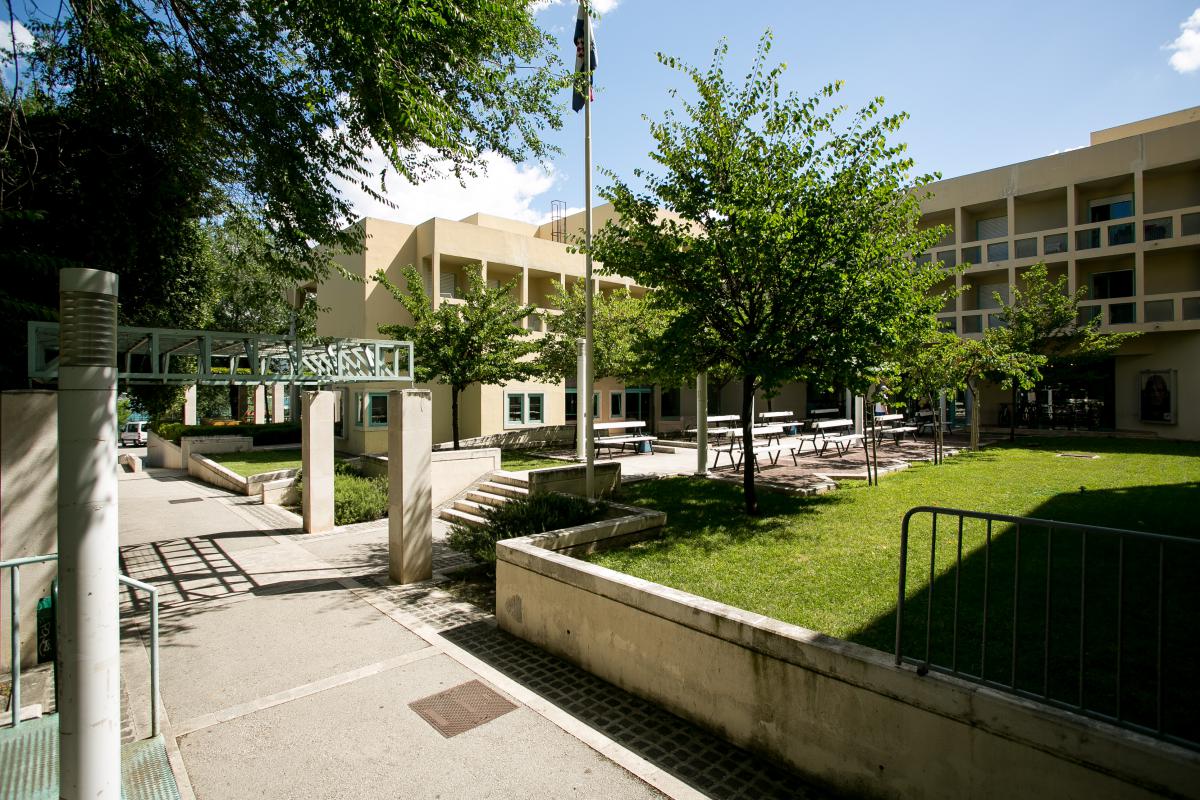
Student Accommodation Hostel Spinut (Photo: Split Student Center)
Rijeka
- Studensko Naselje ”Trsat”
Ul. Radmile Matejčić 5, 51000, Rijeka
e-mail: [email protected] / Student Center: [email protected]
Tel. +385 51 584 530
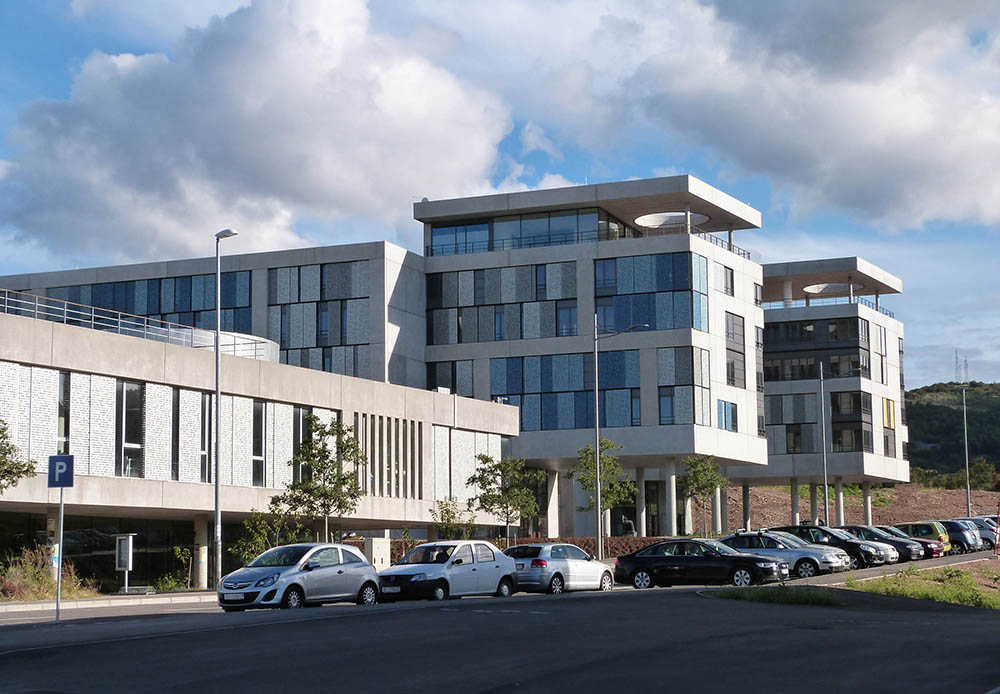
Student Accommodation Trsat (Photo: Rijeka Student Center)
Osijek
- Studentski Dom IGK
Ivana Gorana Kovačića 4, Osijek 31000
Phone: Management – (031) 574 002
Reception – (031) 574 269
Working hours of the administration: from 7-15 hours
work with clients 08-14 hours
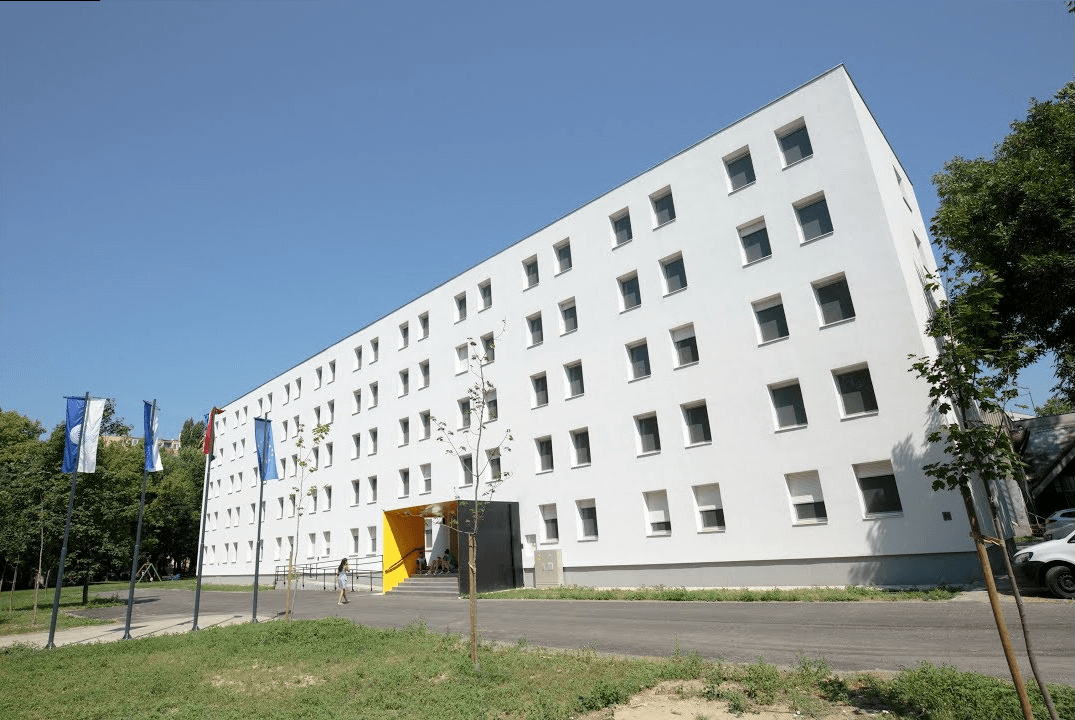
Student Accommodation IGK (Photo: Osijek Student Center)
- Studentski Dom K.P. Svačića
Kralja Petra Svačića 1C, Osijek 31000
Phone: Management – (031) 251 121
Reception – (031) 251 120
Working hours of the administration: from 7-15 hours
work with clients 08-14 hours
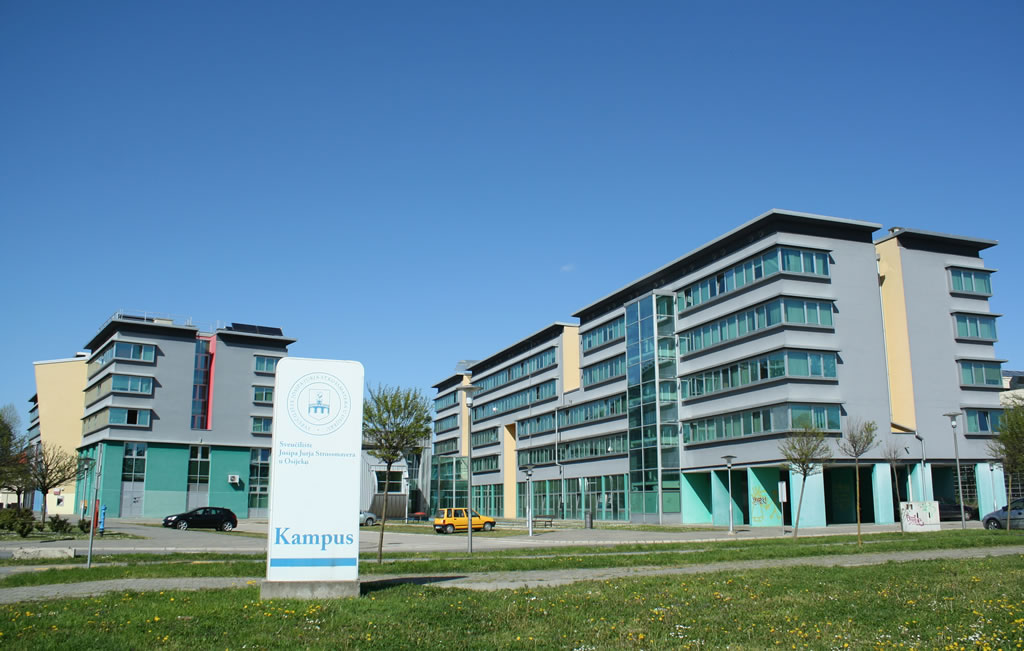
Student Accommodation K. P. Svačića (Photo: Osijek Student Center)
Do not forget to bring your medical certificate in case they have previously requested it by mail. You must also present your passport to be identified. You will be asked to fill out a form related to COVID-19 and sign a contract. Once registered, they will give you your keys and indicate your pavilion and bedroom. In some accommodations, such as in Rijeka, they will give you directions for the use of other facilities such as the laundry, gym, and library.
Note: Remember that student accommodation in Croatia CANNOT be used for self-isolation. It is also prohibited to consume alcohol or drugs inside the accommodation. Doing so may mean your expulsion from the scholarship and not being able to apply again in the future. Remember, when you come to Croatia you are a representative of your country.
5. Formally enroll in the course at the Faculty of Philosophy
Once you have checked into your accommodation and taken a good rest, go to the Faculty of Philosophy in your city, to officially enroll in the Croatian language course. In each Faculty, there is the department in charge of organizing the Croatian language course in that city, and they will provide you with the necessary information about the course, as well as some documents that will be useful to you. We recommend that you attend the Faculty early to enroll since in many cases they only work until 1:00 p.m. or 2:00 p.m.
You will have to ask them about the public transport card, and they will give you a student document and instructions to acquiring it at the public transport office in your city. Also, ask them about the WiFi, and they will give you your username and password that can be used both in the building of your Faculty, as well as in your accommodation and in various parts of the city.
Remember when I mentioned above that you organize all your documents in one folder? It would be a good idea for you to take it to the Faculty at the time of enrollment, they will surely ask for an ID and probably passport-size photos.
The Croatian language course is organized at the Faculty of Philosophy in Zagreb, Split, Rijeka and Osijek, and is conducted by the Center for Croatian as a Second and Foreign Language “Croaticum” (Zagreb), the Center for Croatian Studies in the World (Split), Rijeka Croatian School (Rijeka) and the Department of Croatian Language and Literature (Osijek).
Depending on your city, this is where you should head to:
- Zagreb: Ul. Ivana Lučića 3, 10000, Zagreb / http://www.ffzg.unizg.hr/centar / +38514092111 (On Google Maps)
- Split: Poljička cesta 35, 21000, Split / http://www.ffst.unist.hr/ / +38521386122 (On Google Maps)
- Rijeka: Sveučilišna Av 4, 51000, Rijeka / http://www.ffri.uniri.hr/ / +38551265600 (On Google Maps)
- Osijek: Ul. Lorenza Jagera 9, 31000, Osijek / https://www.ffos.unios.hr/ / +38531211400 (On Google Maps)
Note: the Croatian language scholarship includes the two subsidized meals, and for this, you will need a card that will be provided by the Central Office of the State for Croats outside the Republic of Croatia, through the Croatian language department in your Faculty. Unfortunately, it is unlikely that you will receive it on the first day or even in the first few weeks, so you will need to be patient. Eventually, it will be your teacher who will give you your card.
6. Register your address at the police station
Something essential and that depends largely on you, is to register your residence in Croatia. Although there are students with a Croatian passport, this is not an exception to do so, because in Croatia it is mandatory to have a registered residence and address, and this information does not appear in the passport. Likewise, those who do not have a passport should even more so register their residence since the duration of the course exceeds 90 days of free transit through the country as a non-EU citizen.
The Central State Office for Croats outside the Republic of Croatia, through your Croatian language department in your Faculty, will provide you with a study contract for the scholarship that you will need to bring to the police station in your city. In addition, you must bring your original passport and the accommodation contract that you were given when you check-in at your student accommodation (or in case you have stated elsewhere, a valid accommodation document or contract).
Like the meal card, the study contract can take a few weeks to be delivered, so you must be patient and, as soon as you receive it, go to the police station.
The police stations in each city are as follows:
- Zagreb: Ul. grada Vukovara 33, 10000, Zagreb (On Google Maps)
- Split: Trg Hrvatske bratske zajednice 8, 21000, Split (On Google Maps)
- Rijeka: Ul. Žrtava fašizma 3, 51000, Rijeka (On Google Maps)
- Osijek: Trg Lavoslava Ružičke 1, 31000, Osijek (On Google Maps)
For those interested in applying for their citizenship or passport, this is a vital step to achieve it, since these procedures (especially that of citizenship) can take several months, even longer than a semester of studies lasts. In addition, if you do not have a permanent or temporary residence in Croatia, the Ministry will simply reject your application. Therefore, those without a Croatian passport will have to apply for a one-year temporary residence in Croatia and to achieve this you will need to present the aforementioned documents at the police station, including the study and accommodation contract. Remember then that before applying for citizenship, you must first apply for temporary residence. Unfortunately, both cannot occur in parallel, and you must first receive the resolution of your approved temporary residence before applying for citizenship.
Note: it is highly recommended to organize yourself and be clear about where you will spend the year in which you process your citizenship. For example, if you really believe that you will spend a year in Zagreb studying the Croatian language, apply for temporary residence and your citizenship in that city. Another example is of someone who applies for a first semester to Split, and at that time they apply for temporary residence. Then, they decide to apply for a second semester in Osijek, while they wait for the resolution of their temporary residence. This is not recommended as the police consider your address to be in Split, not Osijek. This could affect obtaining your temporary residence or your citizenship.
7. Open a bank account
While opening a bank account is important in any circumstance, as a scholarship student you have an additional reason to consider it. If you stay in student accommodation, you will have to pay the cost of accommodation on a monthly basis (the amount depends on the accommodation). You should go to your accommodation office at the beginning of the month and make the payment.
“But didn’t the Croatian language scholarship include free accommodation?” Yes! Compensation for accommodation will be paid to you after you submit the following documents:
- certificate from the Faculty of Philosophy on successfully completed course,
- a Žiro account agreement (not a current account), in your name, concluded with any commercial bank in the Republic of Croatia, with the indicated giro account number (IBAN),
- certificate (certificate) of the Ministry of the Interior of the Republic of Croatia (MUP) on your residence/stay in the Republic of Croatia, with the stated address of the student settlement.
- One of the attached documents should also show your personal identification number (OIB).
Once you obtain your accommodation contract, which will be given to you the day you check in at your student accommodation, take that contract along with your passport to the bank of your choice, and in addition to a current debit account, you must also request a Žiro account (pronounced: SHI-ro). At the end of the course, you must send the IBAN (account number) of your Žiro account to the Central State Office, to receive compensation for your accommodation.
Note: to open an account in a Croatian bank it is not necessary to have permanent residence in the country or Croatian citizenship. All you need is an OIB (Osobna Iskaznica Broj) identification number. If you have a Croatian passport or ID, you will find this number in either of the two. If you don’t have an OIB number, you will need to get one. To find out how to obtain an OIB number, check out this Expat in Croatia guide, which includes the form to fill out and all the necessary steps. Remember that you will also need your OIB to request accommodation compensation at the end of the course.
8. Buy your study materials
To study the Croatian language you will need a learning book and an exercise book. Don’t worry if you still don’t have your books to study the Croatian language as soon as you arrive. Usually, your teacher will provide you with copies in the first few days, and it is he or she who you can ask where to get them. Remember that you will not be given copies for the entire semester! Most likely, your faculty has its own bookstore, where you can buy your books to study Croatian.
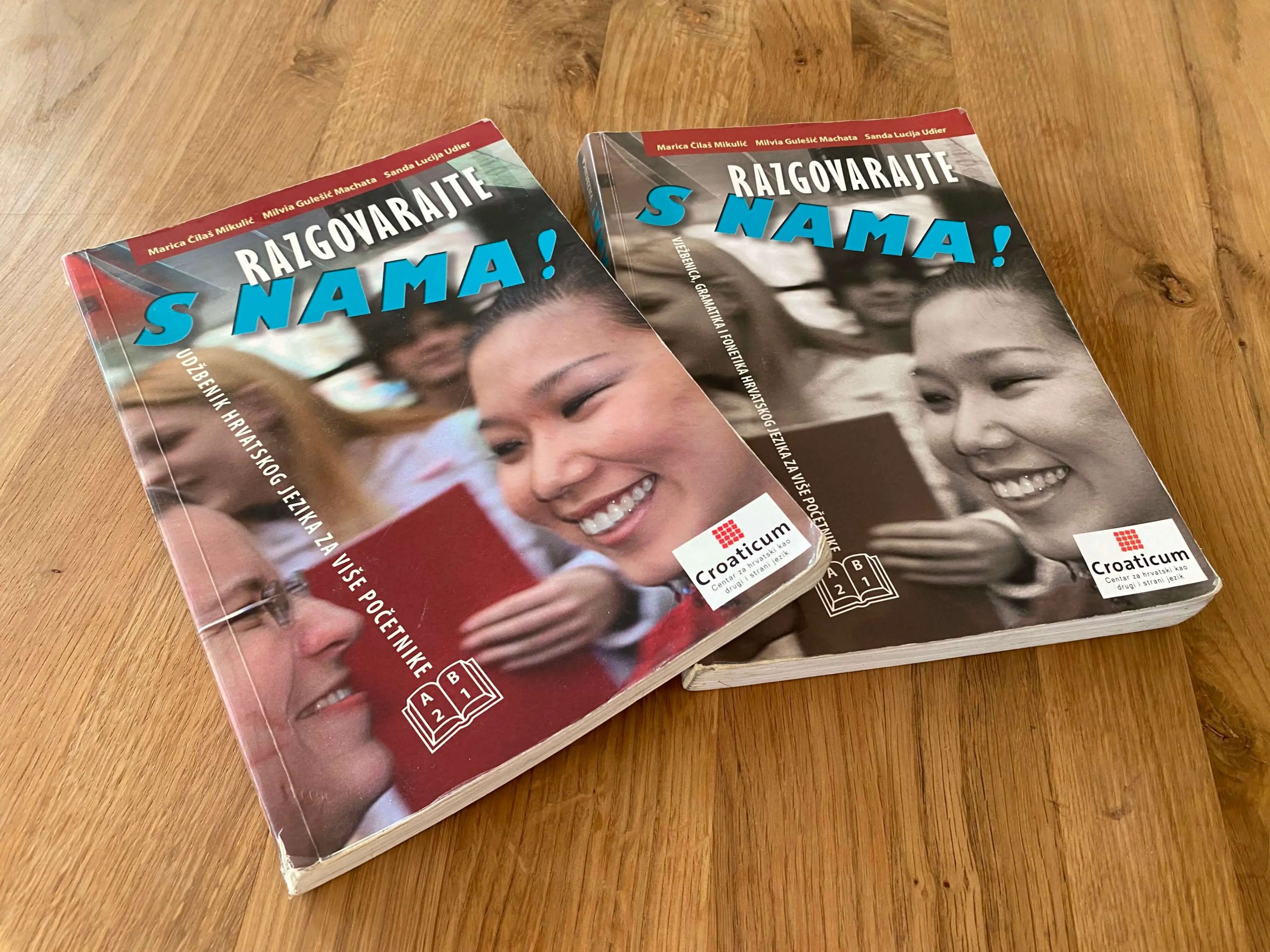
The learning book on the left, and the exercise book on the right. These books are for the A2/B1 level. (Photo: Jose Alfonso Cussianovich)
Take good care of your books, as they can be useful even after studying the course. The learning book includes a Croatian to English dictionary on the final pages, and the exercise book includes tables of contents at the end for easy review of rules for declensions, conjugations, and more.
Note: make sure that the books you buy correspond to your learning level. If this is your first time studying the Croatian language, you will most likely need to buy the A1 / A2 level books.
9. Respects health measures against COVID-19 in your accommodation and faculty
Despite the difficulties and obstacles due to the COVID-19 pandemic, the Central State Office for Croats outside the Republic of Croatia managed to develop the scholarship for the Croatian language course in the March-June 2020 semester, the semester from October 2020 to January 2021, and the semester from March-June 2021.
The only possible way to develop the Croatian course was through online learning, thus respecting the measures and restrictions imposed by the Croatian government. As the epidemiological situation began to improve over time, some faculties such as Zagreb and Split returned to face-to-face classes for the March-June semester of 2021. It should be noted that in order to develop face-to-face classes normally, the use of masks, as well as the reduction of the number of students per class, and distribution of seats in the classroom that respects social distancing.
It is expected that this year all the faculties will return to face-to-face teaching, but that means respecting, in the same way, the epidemiological measures to combat the pandemic. Masks are mandatory. Through the call made by the Central State Office in May, a special call was made to the selected students to reconsider the possibility of traveling to Croatia and that, as an alternative, they could still take the language course online from their countries.
During the study time of the course, it is recommended to avoid attending classes in case you feel fever, malaise, or cold. Notify your teacher and classmates by mail if you suspect you may have COVID-19. Take a PCR test to rule out that you have COVID-19. If it is negative, communicate with your teacher and classmates so that they are calm. If it is positive, contact the health center and your accommodation, and follow their instructions to be transferred to other facilities where you can perform isolation during your recovery. Remember, student housing cannot be used, under any circumstances, as a place for self-isolation.
In case you feel ill or feel obliged to miss class, let your teacher know in advance and you will see that it is possible to attend class online from your room.
IMPORTANT: If you have already been vaccinated, it is important that you provide this information to your accommodation when registering upon arrival. We also recommend you go to the HZZO (Croatian Health Institute) and ask for the COVID Passport, which is a QR code that will begin to be requested on a mandatory basis throughout the country to attend different events or places.
Note: If you have not yet been vaccinated and want to do so, contact the Central Office of the State, and it is very likely that they will help you get a vaccination appointment in your city.
Note: Do not forget to wear a mask in the corridors of your accommodation and faculty.
For all you need to know about coronavirus specific to Croatia, including travel, border, and quarantine rules, as well as the locations of vaccination points and testing centers across the country, make sure to bookmark our dedicated COVID-19 section and select your preferred language.
10. Get everything ready for your trip to Croatia!
Weather in Croatia
Now that you know everything you need to know before traveling to Croatia and attending your Croatian language classes, get ready for the months to come! You will surely attend the semester from October 2021 to January 2022, for which I will tell you what is the climate that awaits you in the Croatian autumn and winter.
If you attend classes in Split or Rijeka, you will find yourself in the second and third largest cities, respectively, in Croatia, and both are located on the Adriatic. In October you will find warm and sunny days where the temperature can reach up to 20 degrees, as well as cold but not icy nights, with temperatures that drop to 14 degrees. It is possible to take a dip in the sea during this month! However, it is likely that at this time of year (especially in these two cities) you will find rains, winds, and storms that begin to appear more frequently. In Zagreb, located in central Croatia, and Osijek to the east, the weather may be similar, but surely less sunny.
Starting in November you will notice that the temperatures will begin to decrease progressively (17 degrees max, 10 degrees min), and the sunny days will become less frequent. You will get used to the strong winds and rain. Already in December and January, you will start to wrap yourself more warmly against the cold temperatures both during the day and at night (5 degrees max, and temperatures can drop to -5 or -7 degrees. If you are in Zagreb or Osijek, prepare for the snow!
Therefore, we consider it essential that you bring:
-
A jacket to keep you warm in very low temperatures
-
Cotton or wool sweaters
-
A windbreaker that can also keep you warm
-
A waterproof jacket for the rain
-
Leg warmers
-
Warm socks
-
Winter pajamas
-
Waterproof boots (you can ruin your white sneakers in puddles caused by rain)
-
Winter gloves
-
Hats for the cold
-
Umbrella (very important!)
-
Sunglasses (despite the low temperatures, there can still be very sunny days and the sunlight bouncing off the marbles of Diocletian’s Palace in Split could leave you blind!)
In the winter months, the student accommodation turns on the heat in the student rooms. We recommend that you check this at the offices of your accommodation since in some cases it is necessary to confirm that you expressly wish to do so.
If you applied for two semesters or plan to apply for a second one while attending the first one, then you’ll expect hotter months from May to June. But don’t worry, you’ll have enough time to buy some shorts, swim trunks, or sandals. My suggestion? Travel light! Clothes prices in Croatia are great, so you can travel with what you really need and search for whatever you might need later here.
To learn more about the weather in Croatia, visit the complete Total Croatia guide.
In case you find yourself caught in a rain or storm in Croatia, read this interesting page from Total Croatia on what to do while it rains in Croatia.
Currency in Croatia
Regarding the currency, remember that in Croatia the Euro is not used, but rather the Kuna. In addition, it is very likely that in several places they will ask you to use cash and not a card. If you arrive at the airport, we recommend that you change only a little of your money there to move to the city. It is preferable that you exchange your euros or dollars at an exchange office in the city, where the prices are better.
To give you an idea, one euro is equivalent to 7 kunas. While a dollar is equivalent to 6 kunas.
The expenses during your stay may vary depending on the city, but with some approximate ones, you could calculate what you will need monthly:
- 100 kunas per month to cover public transport
- 105 kuna per month to cover your meal (using the card for the two subsidized meals)
- 120 kuna per month for laundry (once a week, 30 kuna)
- 540 kunas per month to pay for accommodation (in Zagreb the amount is 300 kuna, but we have put the most expensive in Rijeka as a reference)
- 150 kuna per month to pay for an unlimited data plan on your phone with Telemach
- 2000 kuna for extra expenses (food, clothing, movie tickets, taxis, travel, etc)
In total, you may need approximately 3815 kuna or 450 euros to cover some monthly expenses.
For more information about currency in Croatia, visit Total Croatia ‘s complete guide.
Transport in Croatia
Depending on your city, you will notice that public transport is different. If you are lucky, it is likely that you will quickly become familiar with the routes and bus stops in your city, but most likely at first you will miss a stop or get lost. Don’t worry, the four cities have very well organized transport systems and, if you make a mistake, you will see that you will be able to orient yourself again.
In Zagreb, the city has a transportation system that includes tram and bus routes. You can get to any part of the Croatian capital in both. You should make sure you have a balance on your public transport card, and remember that at the beginning of the month you will have to recharge it at a Tisak or at the Zagreb Public Transport (ZET) office, as it cannot be accumulated between different months. Another alternative is to buy 4 kuna tickets in a Tisak, which you can use to make two trips within 30 minutes on both the tram and the bus. You can also buy the ticket from the driver, but this will cost you 6 kuna.
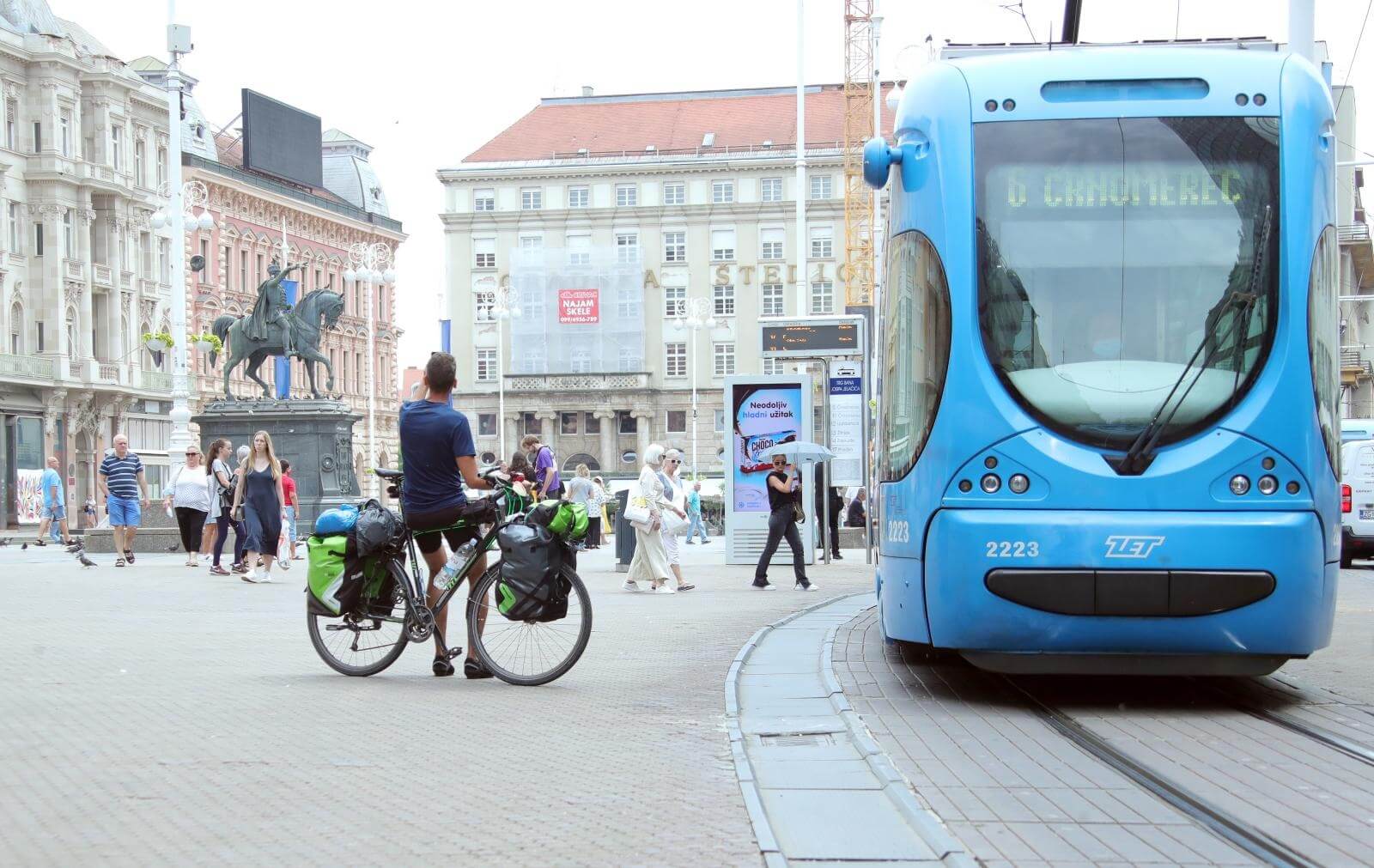
The Zagreb trams at the Ban Josip Jelačić square (Photo: Sanjin Strukic/PIXSELL)
In Rijeka, the city has a bus system called Autotrolej that connects the city. As in Zagreb, you will need to get your public transport card to move from Trsat (where your accommodation and classes are) to the center and vice versa. In this city, it is highly recommended to have the card, since the largest number of shops and restaurants are in the center, and to return to Trsat you have to walk a lot and through steep streets, which in these times can become streams of water with storms and rains. The buses that take you to and from Trsat are lines 2, 7a, and 8. If you want to buy the ticket from a Tisak or from the driver, it will cost you 10 kuna if you travel from Trsat to the center of Rijeka and vice versa.
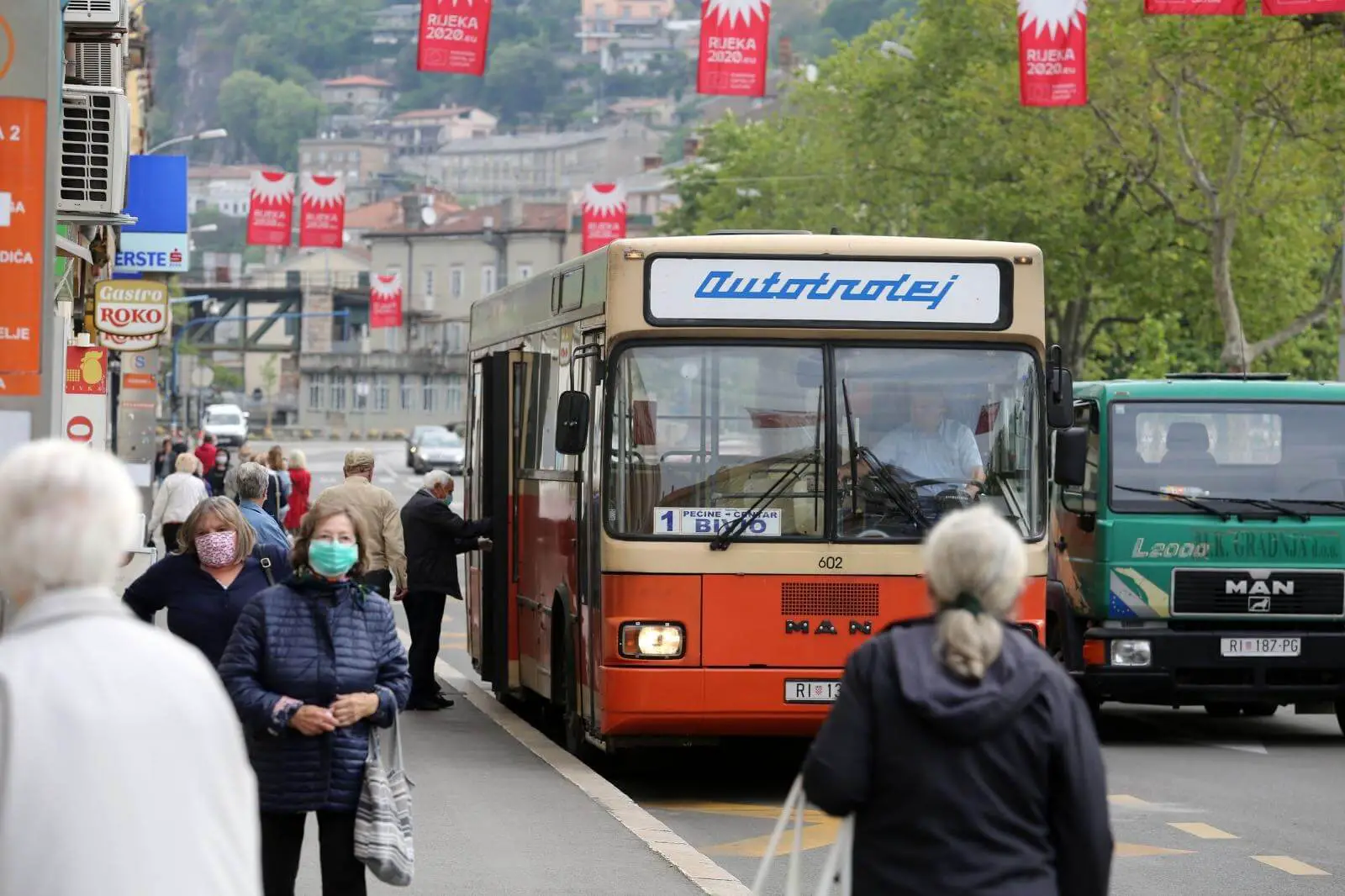
The buses in Rijeka (Photo: Goran Kovacic/PIXSELL)
In Split, as in Rijeka, you will find a network of buses that runs through the different areas of the center and the outskirts. Split public transportation company is called Promet Split. For detailed maps of their city and suburban lines, as well as ticket prices, check out their official website. Most of the locations within Split fall into Zone 1 in the company’s price list. Zone 1 tickets for a single ride cost 9kn when bought on Tisak, 11kn when bought on the bus. The daily ticket is 30kn.
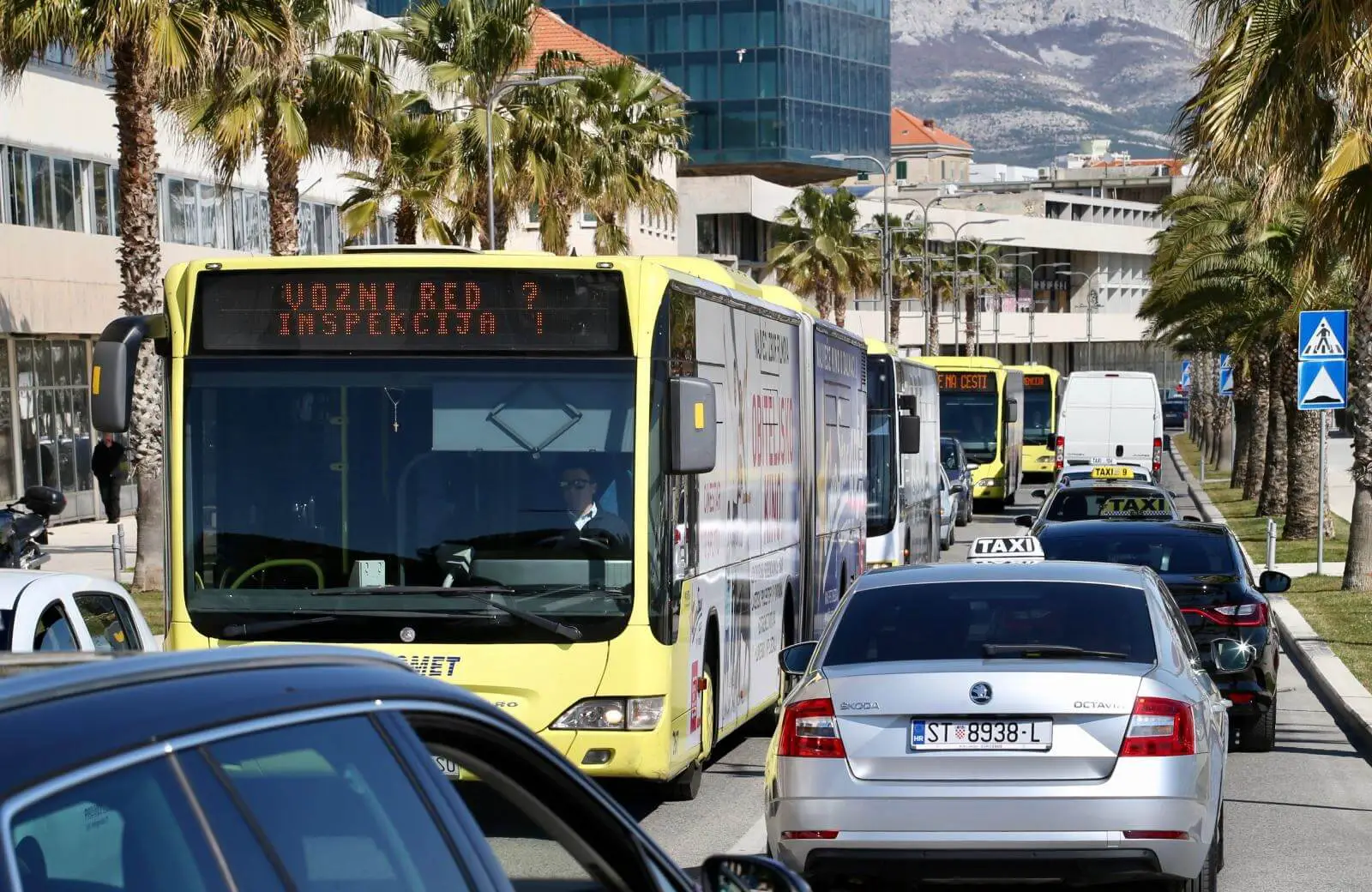
The buses in Split (Ivo Cagalj/PIXSELL)
Osijek was the first city in Croatia to have a tram system. In fact, trams still run through the city: it’s the only place in Croatia outside Zagreb that has trams. Osijek is a very pleasant city to walk around. Indeed, you can walk between all of the city’s key areas without barely leaving fantastic park ground. And we recommend you do just that. However, Osijek is also nicely covered by public transportation. In this case, that means cheap local buses and trams. Additionally, there are well-priced taxi services. It costs only around 20 kn to travel anywhere in the city (within 5 km).
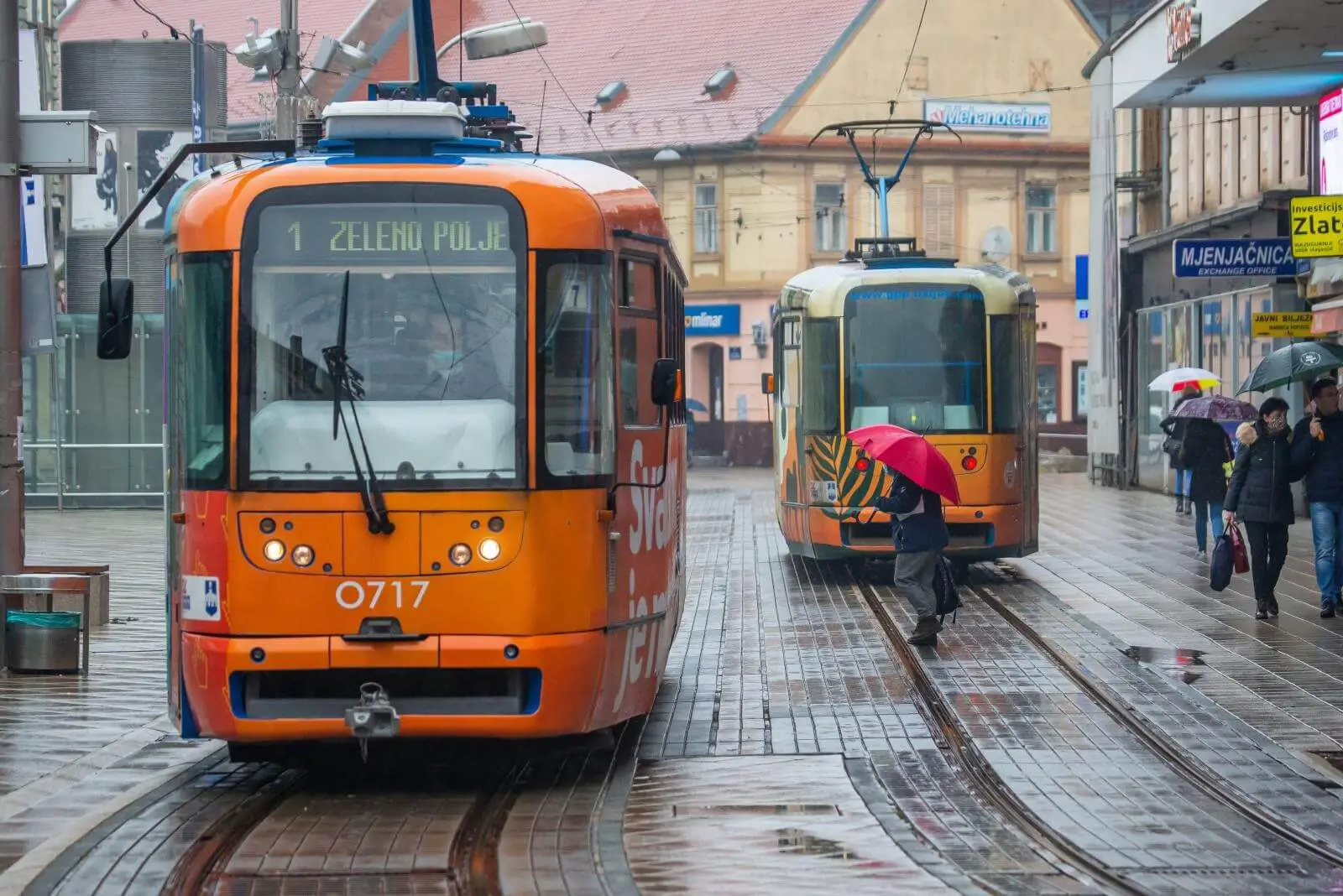
The trams in Osijek (Davor Javorovic/PIXSELL)
Not only will you find that it is easy to move from one place to another in the city, but that you will also be able to travel to all destinations in the country through buses and trains. If you’re familiar with Uber, you’ll be able to catch one anywhere in your city and even at late hours. Other options for Taxis are Cammeo and Bolt.
Health in Croatia
You will most likely arrive in Croatia with international health or travel insurance. Make sure you bring the necessary documentation related to that insurance. In case you need a consultation with a specialist or have to go to emergencies, contact your insurance before and after to cover the expenses. Medical receipts for those who are not enrolled with insurance can be ruthless. In addition, in pharmacies, it is essential to present a prescription to obtain your medications. A doctor assigned by your travel insurance can fill this prescription and mail it to you.
In case you are interested in public health insurance, especially if you wish to stay for a longer period of time even after the course ends, health insurance in Croatia is mandatory for all those who have temporary or permanent residence in the country, both ones with Croatian citizenship and foreigners. If you have an OIB, you can apply for Croatian health insurance. Check with the HZZO (Croatian Health Institute) offices if Croatian health insurance is right for you or if you are eligible. In the most likely case, you will have to pay the equivalent of the previous year to enroll, and you must not be affiliated with private or public insurance in your country of origin. Once enrolled, you will have to pay 500 kuna per month that will allow you to access prescribed medications, medical consultations, and cover expenses in the emergency room. Also, you will need to register with a GP.
To learn more about the healthcare system in Croatia, visit this guide from Total Croatia, where you will find information about specialists (some of them that speak in English), emergency numbers, hospitals, and insurance.
If you’d like to have emergency contact numbers handy, check out this Total Croatia page.
To learn more about Zagreb, such as places to see, things to do, museums, restaurants, bars, cafes, public transport, fun facts, events, and more, visit their Total Croatia page.
To learn more about Split, such as places to see, things to do, museums, restaurants, bars, cafes, public transport, ferry, fun facts, events, and more, visit their Total Croatia page.
To learn more about Rijeka, such as places to see, things to do, museums, restaurants, bars, cafes, public transport, ferry, fun facts, events, and more, visit their Total Croatia page.
To learn more about Osijek, such as places to see, things to do, museums, restaurants, bars, cafes, public transport, fun facts, events, and more, visit their Total Croatia page.
To find out more about what you need to know about Croatia, how to get around the country, destinations you can visit during your stay, and things you can do and see in these months, visit www.total-croatia.com, available in your language!
If you wish to learn more or have any questions about the Croatian language scholarship given by the Central State Office for Croats Outside the Republic of Croatia to study the Croatian Language in Croatia, send me an email to [email protected]

